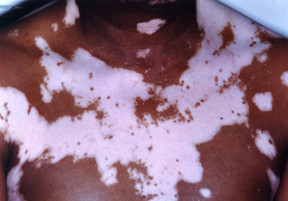Recent Blog Articles

Lead poisoning: What parents should know and do

How does waiting on prostate cancer treatment affect survival?

Does running cause arthritis?

Is alcohol and weight loss surgery a risky combination?

Preventing ovarian cancer: Should women consider removing fallopian tubes?

Healthier planet, healthier people

Is snuff really safer than smoking?

Will miscarriage care remain available?

Considering collagen drinks and supplements?

Does less TV time lower your risk for dementia?
Vitiligo
What Is It?
Vitiligo consists of white patches of skin that are caused by the loss of melanin, the pigment that is a major contributor to skin. Melanin is produced by special cells called melanocytes, which are destroyed in people who have vitiligo. The cause of vitiligo is not known but evidence strongly suggests that vitiligo is an autoimmune disorder, in which the body's immune system mistakenly targets and injures these specific cells.
|
Vitiligo can cause minor changes or extensive changes in the skin. In some people, it may be hardly noticeable, while in others it is obvious. In dark-skinned people the vitiligo patches are obvious since they contrast with normal skin. Light-skinned people may have fewer cosmetic concerns, but patches without pigment can become obvious in the summer because unaffected skin tans while vitiligo skin does not tan.
To continue reading this article, you must log in.
Subscribe to Harvard Health Online for immediate access to health news and information from Harvard Medical School.
- Research health conditions
- Check your symptoms
- Prepare for a doctor's visit or test
- Find the best treatments and procedures for you
- Explore options for better nutrition and exercise
I'd like to receive access to Harvard Health Online for only $4.99 a month.
Sign Me UpAlready a member? Login ».
Disclaimer:
As a service to our readers, Harvard Health Publishing provides access to our library of archived content. Please note the date of last review or update on all articles.
No content on this site, regardless of date, should ever be used as a substitute for direct medical advice from your doctor or other qualified clinician.
Free Healthbeat Signup
Get the latest in health news delivered to your inbox!

